2024 was a year of incredible discovery. A new injectable miracle drug protects against HIV for six...
Annual Research Trends From NewsRx’s BUTTER
2023 and the start of 2024 in research were full of illuminating studies and earthquaking discoveries alike. Using NewsRx’s research tool BUTTER, we analyzed hundreds of thousands of peer-reviewed research articles, preprints, patents, and more to uncover exciting trends in the past year’s science.
Read on to explore trends in studies related to the COVID-19 pandemic, climate change, health and medicine, artificial intelligence and technology, and the Russia-Ukraine and Israel-Hamas wars.
COVID-19 Research in 2023
Since the emergence of the novel coronavirus in late 2019 and early 2020, over 6 million individuals have died in a pandemic that changed the course of history. That includes an average of over 1,000 COVID-19-related deaths per week in the U.S. this year, composing some 2-3% of total deaths.
Nonetheless, the pace of coronavirus research slowed this year, after it came to dominate the scientific world in 2021-2022 in particular.
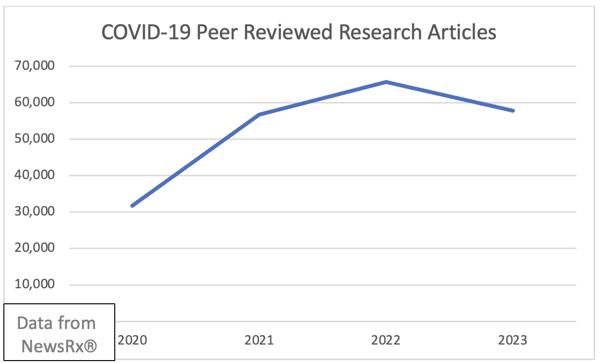
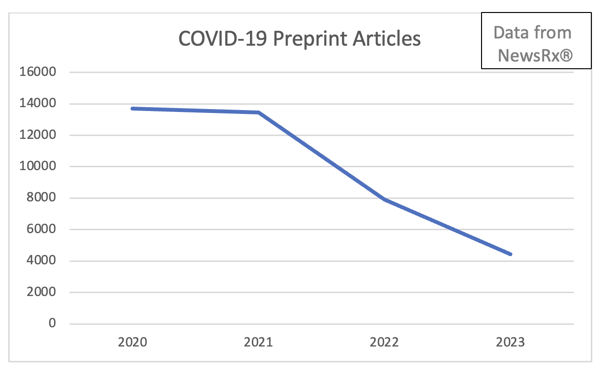
A peak of nearly 66,000 COVID-related peer-reviewed research articles in 2022 fell to under 58,000 this year, an approximate 12% decrease. The decline in preprint articles is precipitous, plunging by 79% since 2022 and by 300% since 2021. Although one factor may be scientists pivoting away from the timelier but less rigorous preprint publication, many are simply returning to other research topics of interest as seeming urgency of the pandemic fades.
COVID-19 nonetheless remained a huge topic of focus for scientists across disciplines in 2023. Risk and prevention, CDC & FDA, and public health were massive study topics, with each one featuring well over 10,000 peer reviewed articles. The COVID vaccine with 6,832 studies, long COVID with 4,724 studies, telemedicine with 1,577 studies, and artificial intelligence with 917 studies also proved to be fruitful areas of investigation.
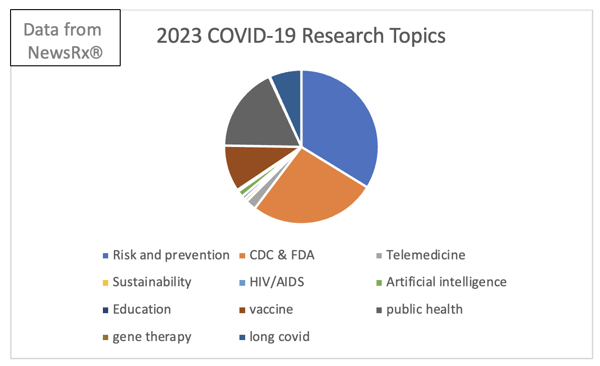
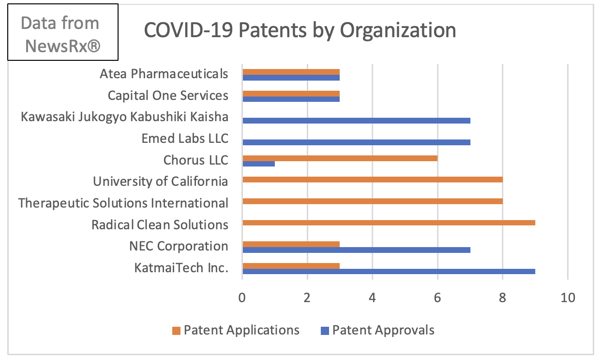
2023 saw many corporations focus on patenting new products and technologies related to COVID-19. KatmaiTech Inc, a remote workspace company, patented a number of items related to virtual environments. NEC Corporation, a multinational Japanese IT firm, patented technologies related to sensing and tracking. Given that the average patent application takes nearly two years to get approved, most of the approvals were likely initiated sometime during 2021, during the height of the pandemic.
Climate Change Research in 2023
The damages of climate change were keenly felt in 2023, officially the hottest year on record. The earth has warmed 1.2 degrees Fahrenheit over historical averages, resulting in deadly heatwaves, floods, droughts, and more severe storms across the world.
Scientists rose to the challenge, producing more peer-reviewed research on climate change than ever before. The number of articles has in fact risen by over 50% since 2020.
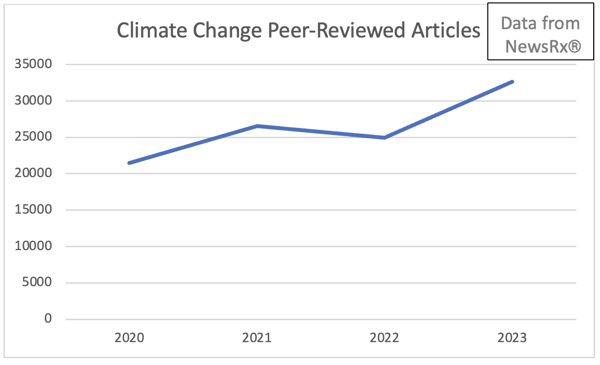
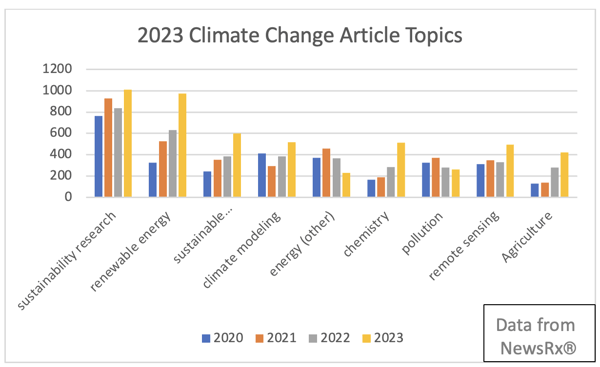
Almost all major areas of climate research, from renewable energy to sustainable development and agriculture have grown substantially in the last four years. Only studies on pollution and non-renewable energy sources have seen declines. In terms of raw numbers, the field of chemistry is especially notable for increasing its volume of climate-focused studies.
Much of the boost in the amount of climate research comes out of universities in China. All 10 of the top climate change study-producing institutions were located in China.
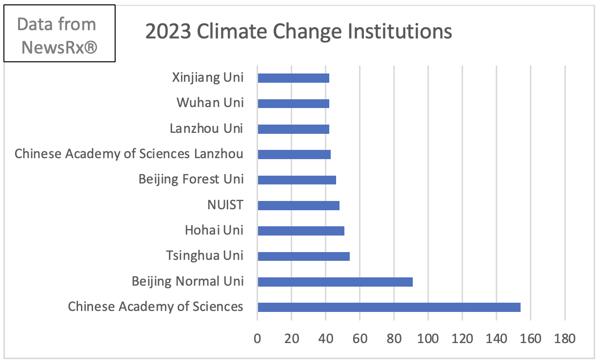
2023 Health & Medicine Research
Excluding COVID-19, the biggest areas of health and medical research this past year were breast cancer, HIV/AIDS, and colon cancer. One notable trend that we observed last year was the rapid rise of studies covering mental health issues, which has come to occupy a dominant position in the medical sciences as the American mental health crisis garners greater and greater concern.
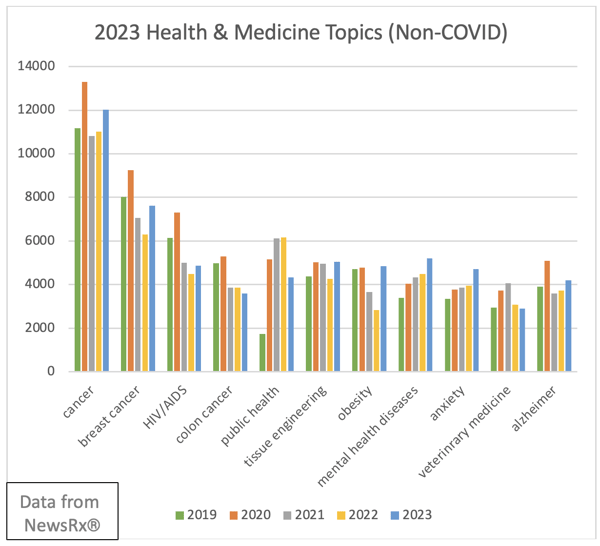
Looking closely at the health & medicine graph, it is possible to observe the “presence” of COVID-19, which temporarily took a chunk out of research areas such as colon cancer, obesity, Alzheimer’s disease, and HIV/AIDS during the height of the pandemic, only for the fields to recover in 2022-2023.
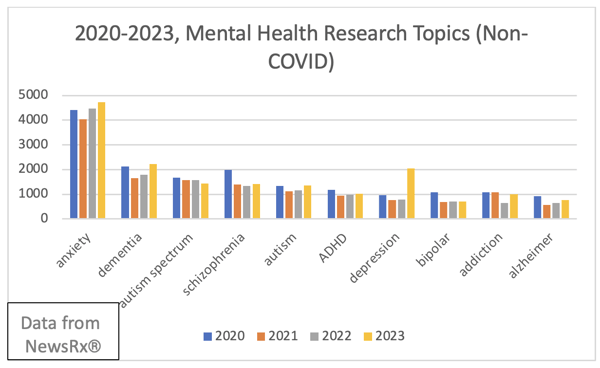
In the arena of mental health, studies on anxiety and depression in particular increased over the last few years, whereas research on schizophrenia, bipolar disorder, and Alzheimer’s disease declined.
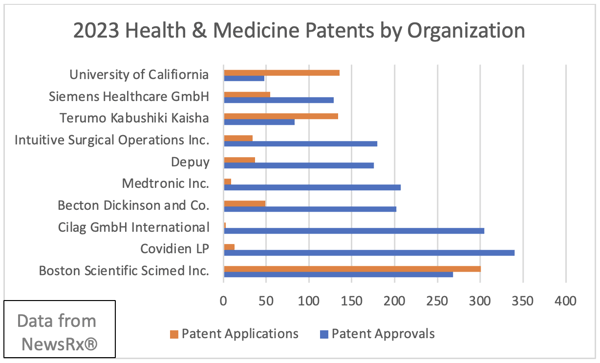
Corporate innovations in medicine also saw a banner year, with a huge list of institutions cracking 100+ relevant patents. Boston Scientific Scimed Inc., a major biotechnology firm, received patents for cauterization devices, circulatory support devices, endovascular devices, and much more.
Technology & Artificial Intelligence
ChatGPT seized 2023, in and out of the sciences. ChatGPT marks the culmination to a drastic rise in studies on artificial intelligence observed over the last decade (just over 1,000 studies per year in 2016, exploding to over 9,000 per year in 2020). While we’ve explored in detail the breakdown for studies on machine learning and AI before, this year, a few noteworthy trends are worth highlighting.
Peer-reviewed research articles on technology have seen sharp shifts since 2020. Articles on information technology, machine learning, chemistry, and photocatalytics have greatly increased. On the flip side, materials science and physics have had lower output in the realm of technology.
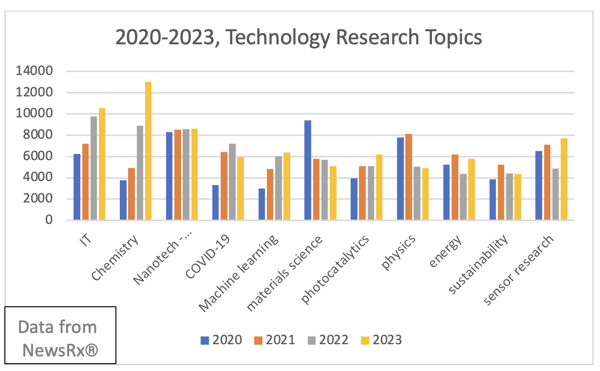
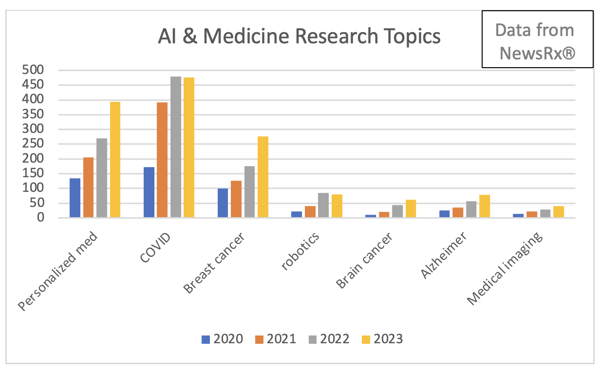
One general trend we previously observed was the use of artificial intelligence in medicine. Within this unique overlap, almost all fields have seen explosive growth. Nearly 400 research studies covering artificial intelligence as applied to personalized medicine is an impressive number, showing just how promising scientists consider this particular application to be.
Next up, let’s take a look at ChatGPT. Of course, before 2023, there were zero articles on “ChatGPT,” but studies did exist investigating previous LLMs, such as GPT-3 and GPT-2. But the release of ChatGPT and GPT-4 caused an unparalleled boom in interest, controversy, and research studies.
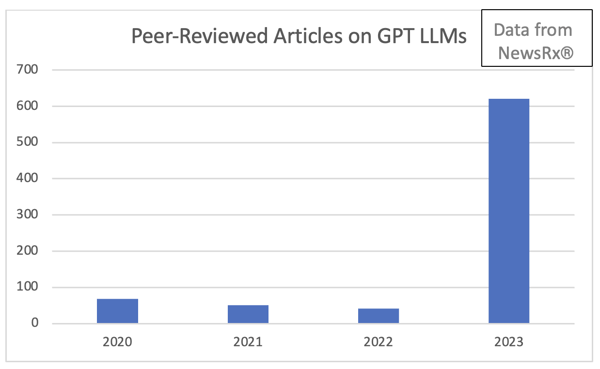
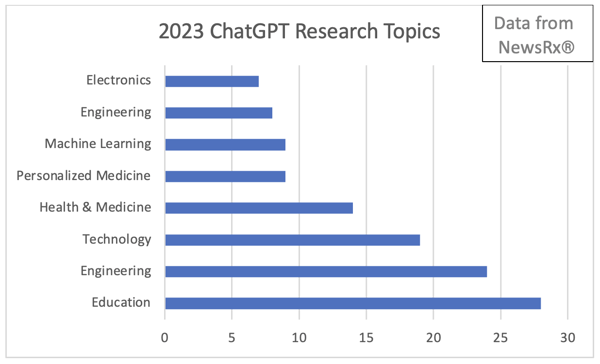
Out of over 600 peer-reviewed studies on ChatGPT in 2023, 28 focused on education, 24 on engineering, and 23 on medicine including personalized medicine.
Wars in 2023
The Ukraine-Russia conflict has been ongoing since February 2022, claiming over 14,000 lives. And an attack by Hamas unleashed new bloodshed in Gaza, where more than 19,000 have died in addition to 1,200+ Israelis.
Neither of these conflicts have gone unnoticed by scientists—especially the Russia-Ukraine war, which was covered by 306 peer-reviewed studies. Only fourteen studies have covered the Israel-Hamas conflict, although we expect that number to rise drastically in the coming months.
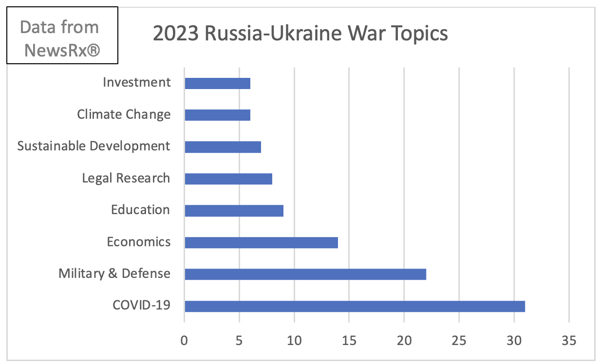
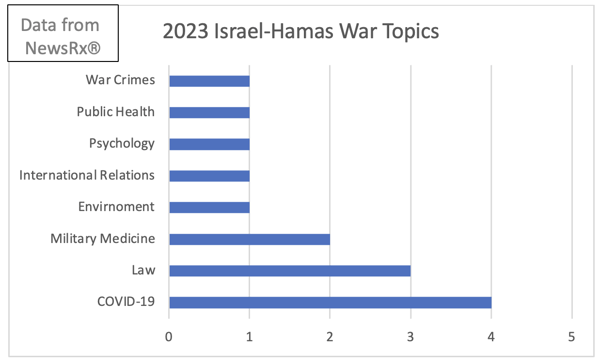
The biggest topic areas for studies on Russia-Ukraine were COVID-19, military and defense, and economics. Interestingly, issues of environment also caught scientists attention, with 13 combined articles on sustainable development and climate change within the context of the war. COVID-19 in Gaza under Israel’s offensive also attracted notable research interest.
It has been a long but fulfilling year of scientific research.
We are proud to support scientists and researchers with our research solutions and powerful tool BUTTER. To explore how you can make use of BUTTER’s datasets for your own insights, check out a few of our explanatory articles:
- BUTTER Tips and Tricks 1: Basic Starters
- BUTTER Tips and Tricks 2: The Advanced Search Function
- BUTTER Tips and Tricks 3: Your Dashboard
- BUTTER Tips and Tricks 4: Newsletters

.jpg?width=50&name=DSC_0028%20(1).jpg)


